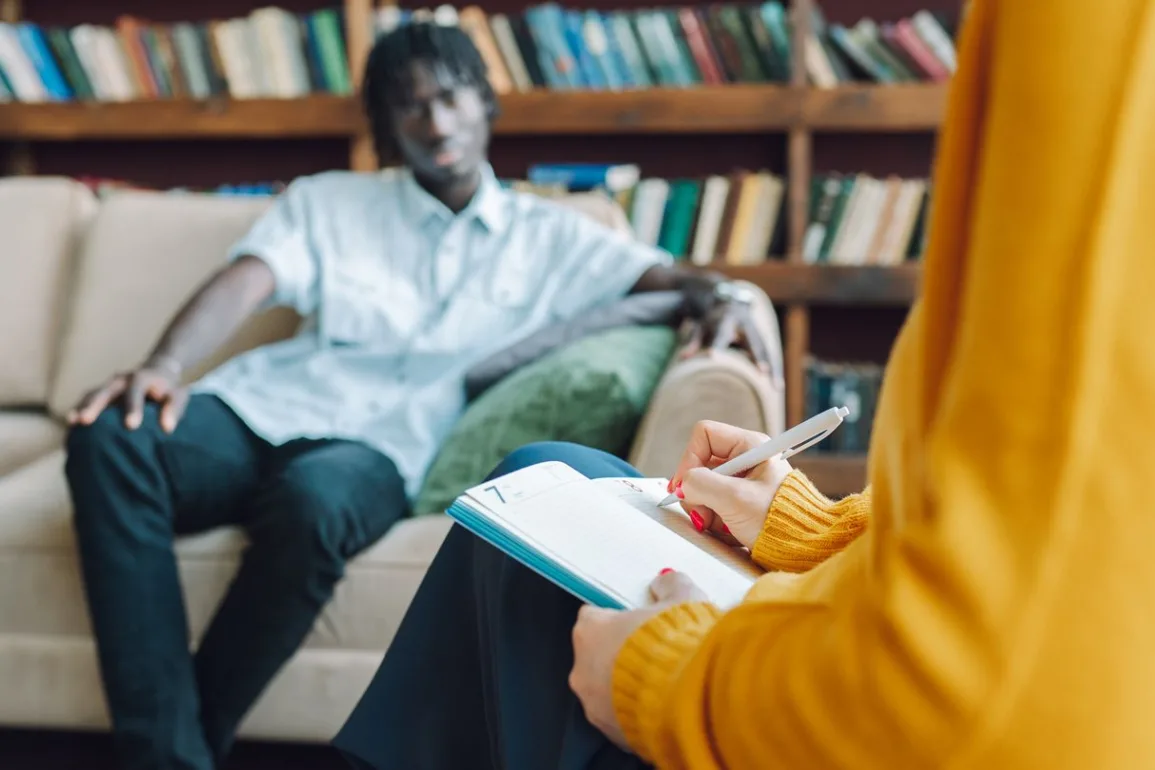
The notion that Black people don’t get depression is a pervasive myth. The reality is that Black Americans do get depression, but they may not always get the proper diagnosis or treatment for it. (Decades of research back this up.)
One factor is clinical depression being more likely to be misdiagnosed as schizophrenia than others. Even when Black people show signs of major depressive disorder (MDD), they’re 3 to 4 times more likely to be diagnosed with schizophrenia-spectrum disorders than white people, per a review published in February 2023 in Frontiers in Psychiatry.
Another study, published in December 2018 in Psychiatry Services, also found that African American people with MDD were significantly more likely to be misdiagnosed with schizophrenia than white people.
There are several factors that can contribute to misdiagnosis of depression in Black people that range from conscious or unconscious bias within the medical system to stigma around getting help for mental health concerns within Black communities.
For instance, it’s worth noting that before a doctor can diagnose someone with schizophrenia, they need to rule out other potential causes of someone’s symptoms first, such as mood disorders like depression, the authors of the Psychiatry Services review note. This data suggests that conscious or unconscious biases among some providers, such as overemphasizing symptoms of psychosis but under-emphasizing mood symptoms among Black Americans, may contribute in part to this misdiagnosis of MDD, according to the authors.
“Systemic stressors, in combination with a clinician’s own racial and ethnic biases — especially if unchecked — contribute to higher occurrences of schizophrenia diagnoses than depression or anxiety in Black people specifically,” says the adult and child psychiatrist Cassandra Raphael, MD, MPH, an assistant professor of psychiatry and public health professional focused on cultural disparities in healthcare, who works for the New York State Office of Mental Health in New York City.
People whose depression is misdiagnosed (as schizophrenia or another mental health condition) can face serious consequences, such as social stigma, increased likeliness of hospitalization, exposure to medications that don’t address the patients’ true needs, potential side effects of an unwarranted treatment, discrimination, and increased risk of suicide, says Dr. Raphael.
Barriers to Getting the Right Diagnosis
Many Black Americans are misdiagnosed and subsequently untreated for depression due to a mix of social, historical, and structural factors, experts say. Some include:
Structural Racism in the Medical System
How structural racism still affects medicine and mental health care today is complicated. Some clinicians may not be as attentive to mood symptoms in African American patients compared with patients in other racial and ethnic groups, and may focus more on psychotic symptoms due to conscious or unconscious racial bias, according to the authors of the Psychiatry Services study.
Racism in medicine has led to significant medical mistrust among the Black community.
Historical examples of mistreatment of Black Americans in healthcare settings may explain some of this mistrust. Over 40 years, the U.S. Public Health Service (USPHS) and the Centers for Disease Control and Prevention intentionally withheld treatment from 399 Black Americans with syphilis as part of the USPHS Syphilis Study at Tuskegee.
For another experiment that went on for 12 years and ended in 1972, researchers at the University of Cincinnati Medical Center exposed at least 82 patients — of whom 61 were Black men and women with low incomes — to unsafe levels of radiation in a study designed to test exposure levels for soldiers, as the Los Angeles Times reported in 1994. Twenty-five people died, and many in the study didn’t know they were part of an experiment, the Los Angeles Times reported.
Another example is the illegal drug testing performed on Black pregnant women at The Medical University of South Carolina (MUSC), which began in 1989. Medical personnel at MUSC and local law enforcement officials secretly targeted and searched 10 pregnant women to find evidence that they were using cocaine so that they could arrest them for drug possession, child neglect, or distributing drugs to a minor, according to the Center for Reproductive Rights.
Up until the 1960s, psychiatrists recognized drapetomania and dysaethesia aethiopia — defined in the 1850s as the desire for freedom among enslaved people — as a mental illness (which was historically used to justify enslavement, according to the National Alliance on Mental Illness).
“Given societal and cultural stigma around mental health symptoms and diagnoses, as well as mistrust of the medical system due to historic harm inflicted by medical institutions, there may be less reporting of psychiatric symptoms that may lead to an appropriate diagnosis,” says Joya N. Hampton-Anderson, PhD, an assistant professor and clinical psychologist in the department of psychiatry and behavioral sciences at Emory University School of Medicine in Atlanta, who studies sociocultural determinants of health disparities. “This stigma and mistrust also may lead to not seeking care at all.”
“Medical mistrust can look like selective sharing, minimizing, or rationalizing of symptoms,” Raphael adds. Patients may also struggle with committing to clinicians’ proposed treatment plans, not keeping appointments, delaying healthcare until the need is emergent, not filling prescriptions, and maladaptive coping behaviors that can collectively result in poorer health outcomes.
Research shows medical mistrust is linked to lower use of healthcare, worse management of health conditions, and lower representation in health-related research among Black Americans and other marginalized groups.
Underrepresentation of Black Providers in Mental Health Care
Many Black people prefer having a mental health care provider with similar life experiences, according to a report published May 31, 2022, by Blue Cross Blue Shield. Another study, published in September 2021 in The Lancet Psychiatry, found that Black or African American people were more likely to prefer a provider who shares in or understands their culture and offers culturally competent care, meaning they’re able to care for patients with diverse cultural beliefs, behaviors, values, and needs.
But Black psychologists make up only about 4 percent of the mental health workforce, while 86 percent are white and the remainder are from other racial and ethnic groups, according to a report published in February 2018 in the American Psychological Association’s Monitor on Psychology. Furthermore, only 2 percent of psychiatrists are Black, the American Psychiatric Association reported in 2021.
When providers share the race or ethnic background of their clients they serve, they tend to be more culturally competent and aware of the barriers their patients face in getting care. Clinicians who lack cultural competence might overlook the impact of historical traumas, acute trauma, and ongoing institutional discrimination and hardship on mental health among Black people, says Raphael. Without this knowledge, it can be hard for a provider to understand the Black experience, she adds.
Access-to-Care Disparities
Further structural factors, like lack of insurance and underinsurance, limit access to mental health providers, says Raphael. “This results in a heavier reliance on primary care and emergency medicine clinicians for mental healthcare,” Raphael explains (and research has shown this). While integrative and collaborative care is becoming more common in these fields, these resources don’t always have the same diagnostic and treatment experience for mood, thoughts, and behavior as mental health professionals do, Raphael adds.
Stigma
Mental illness is still often stigmatized as a sign of weakness in Black communities, Raphael says.
In the aforementioned Blue Cross Blue Shield report, 54 percent of Black respondents reported that individuals with mental health conditions “looked down upon” in their communities compared with 38 percent of white respondents. Because Black people perceive greater stigma around mental health in their communities, this can influence whether they decide to seek care, per the report.
5 Tips for Advocating for Your Mental Health
If you suspect you have depression or that you’ve been misdiagnosed, here’s how experts suggest advocating for your mental health needs:
1. Know the Signs and Symptoms of Depression, Including Lesser Recognized Ones
Potential symptoms of major depression, according to the American Psychiatric Association, include:
- Sadness or low mood
- Loss of pleasure or interest in activities you used to enjoy
- Appetite changes that often lead to weight loss or gain
- Difficulty sleeping or oversleeping
- Tiredness, lack of energy, or fatigue
- Restlessness or slowed speech or movements
- Feelings of guilt or worthlessness
- Issues with thinking, concentrating, or making decisions
- Suicidal thoughts or behaviors
But the symptoms of depression may manifest differently among Black people than they do for people of other racial and ethnic groups. Symptoms like sleep disturbances, self-criticism, and irritability are more common than depressed mood among Black and African American mothers, according to a study published in 2023 in Nursing Research. Similarly, fatigue and anhedonia (being unable to experience pleasure) were more likely than hopelessness, the same study showed.
“Rather than confronting the difficult emotions, people struggling with depression may experience ‘somatic’ symptoms such as frequent and unexplained abdominal pain, headaches, decreased libido, and muscle and joint pain, which some may find easier to acknowledge than emotional struggles,” says Raphael.
2. Explore Culturally Compatible Resources That Challenge Stigma
Raphael emphasizes the importance of reputable pro-Black and anti-racist mental health resources that challenge stigma and normalize treatment. She adds that they can help improve understanding of mental health conditions between cultures, as well as social and environmental contributors to depression and anxiety.
Dr. Hampton-Anderson recommends seeking culturally responsive providers. Directories like Psychology Today, Therapy for Black Girls, and Therapy for Black Men can help you find one. Websites like the Boris Lawrence Henson Foundation and The Loveland Foundation offer funding assistance for treatment. Social media pages like those of Raquel Martin, PhD, and Mariel Buqué, PhD, offer helpful mental health tips as well.
3. Come to Your Appointment Prepared
Preparing in advance for your mental health appointment can help things go more smoothly. Hampton-Anderson recommends writing down your concerns before the appointment. “Feel free to ask these questions and seek additional support from other team members, like social workers, psychologists, and psychiatrists, as a team-based approach often provides comprehensive care,” she says. Bringing your notes stops you from having to remember details in the moment, she adds.
4. Consider Bringing a Support Buddy
Heading to your first mental health appointment can feel overwhelming for anyone. This is even more true for Black Americans who are aware of racial disparities in mental health care, which can affect their willingness to seek care, says Hampton-Anderson.
“Individuals also may benefit from bringing a trusted person to initial mental healthcare appointments,” she says. Having someone present can make you feel more comfortable and help you recall your symptoms and patterns, she adds.
5. Decolonize Your Healing Routine
There’s been a strong focus on decolonizing mental health — or dismantling racism in mental health care — in recent years from mental health practitioners such as Jennifer Mullan, PsyD, founder of a therapy practice called Decolonizing Therapy. The act of decolonizing therapy emphasizes the value of community healing, not just individual healing, according to a review published in 2023 in BMJ.
How can someone do this for themselves? “Engage in the practices that have long been utilized in Black healing, such as art, nature, and movement,” Raphael says. Recognizing and managing symptoms with support from your community can help you feel less isolated, she adds.


